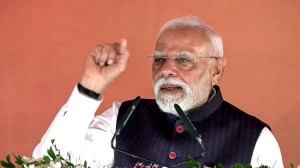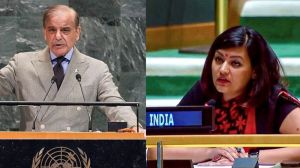The Mind of a Married Man…
KUTARSINH Rathwa, Chhotaudepur taluka panchayat member from Dhadigam village who died six months ago at 65, has 16 children and 60 grandchil...

KUTARSINH Rathwa, Chhotaudepur taluka panchayat member from Dhadigam village who died six months ago at 65, has 16 children and 60 grandchildren. It’s not so surprising if you consider that he has left behind four wives.
But it’s doubtful if any of Rathwa’s sons will improve on his marital scorecard. Youngsters are slowly moving away from the tradition of polygamy, long in practice in this tribal belt of central Gujarat.
Rathwa’s 36-year-old son Amarsinh says tribal society is switching to monogamy.
But the revolt against polygamy has come from women too. While none of Rathwa’s wives objected to the arrival of new wives every couple of years, Amarsinh’s wife Kadliben was unequivocal: ‘‘I want to remain the only wife of my husband.’’ The reason? ‘‘More children will bring poverty. My father-in-law, who had seven acres of land, married several times because he wanted extra hands to work on his field. That freed him for working in the mines to earn cash. But this is not the case today,’’ says Kadliben.
Amarsinh’s two unmarried sisters Kunakiben and Sangitaben would hate to marry married men. ‘‘I will prefer to remain single than be married to a man who is already married,’’ says 20-year-old Punakiben, who is to get married soon to a bachelor from neighbouring Sanada village.
In Broaj too, 25 kms from Dhadigam, tribals are giving up polygamy. Lalia Sotia Rathwa’s father had married twice but he has settled for just one wife. Lalia’s wife Jamniben is in favour of the single-wife norm. ‘‘I see frequent fights, that sometimes end in deaths too, in the families where husbands have more than one wife. Life becomes hell.’’ ‘‘Polygamy is all a game of money practiced by prosperous tribals. Demands in the past were few so it was easy to support two or three wives from 8-10 acres of land,’’ she says.
With the growing disdain for polygamy, having more than one wife is a problem. Forty-five-year-old Bhavla Chikha Rathwa said he had a tough time searching for a suitable match for his eldest son Sublo. ‘‘No one was willing to marry their daughter to my son,’’ said Bhavla. ‘‘They said that since I have two wives, my son would also take more wives. It was a kind of humiliation for me,’’ said Bhavla.
His wife Kapuriben says she has had enough of polygamy. ‘‘I will not permit my sons to marry more than once,’’ she says. ‘‘The question of allowing my daughters to become second wives of a man does not arise at all,’’ she asserts. Kapuriben says that to ensure that her two younger sons and a daughter grow up well and are assimilated in the mainstream, she is giving them good education. ‘‘The game of two wives is over now because landholdings have decreased and expenses have increased manifold as everybody wants to enjoy a good life,’’ says Naikda Bawa Rathwa, who put his wife through tubectomy to limit the family to three daughters and a son. ‘‘It is the growth of education and emergence of a middle-class that has been responsible for the rise of one-wife trend,’’ says Vadodara zilla panchayat president Ranjitsinh Rathwa.
Clearly, for the tribals now, less means more.





- 01
- 02
- 03
- 04
- 05


























